This page takes less than four minutes to load.
Please let it load before you begin reading the narrative
so that you can enjoy the photos that illustrate the text.
This page takes less than five minutes to read.
ENJOY
CANTERBURY to DOVER
DOVER to CALAIS
CALAIS to PARIS
Sunday, June 4, 2000, and Monday, June 5, 2000
by Judy Sadler
Our bus brought us from Canterbury to Dover through the lovely English countryside. Strikes on the docks in Calais delayed our departure from Dover and so we ate in the fast food type waiting area instead of on the ferry. We also changed our dollars into Francs here. When we finally boarded, we waved good-bye to the white cliffs of Dover, looking forward now to France.
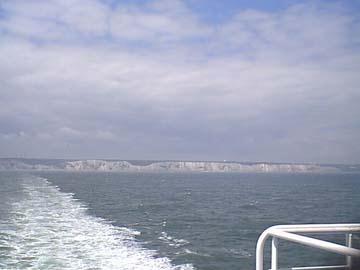
We snoozed in the beautiful ferry, resting up for Paris.
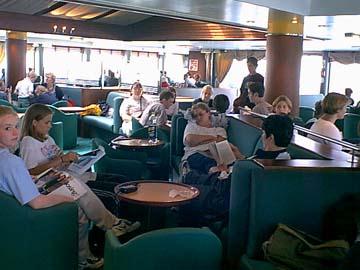
I do believe I see part of our group, Melaine and Michelle on the left, Melissa asleep on the sofa and Nancy reading a book. I can hear you asking - Where are you and JD? Well, I was taking the pictures, of course, and JD was trying to not throw up - successfully, I might add.
We were met in Calais by a bus, and I am happy to say that it drove on the correct, or right side, of the road. We continued our snooze, arriving in Paris in time for dinner at a cafeteria that served a dish we were soon to grow tired of. Chicken and french fries - no vegetable (except french fries) - just chicken and french fries, chicken and french fries, chicken and french fries (the European Chef's idea of American food). We began to get this overwhelming urge to "cluck."
Oh, also on the menu was "fish on a stick." The fish was long and square and how I would have loved to see that fish swim. It looked something like a huge demented popsicle, perhaps the victim of radiation poisoning. If I hadn't been so tired, I would have taken a picture of it.
After dinner, we proceeded to our hotel, the Parc D'exposition, - our bus letting us off at the bottom of the hill so that we had to walk up the hill for two blocks with our luggage. Of course, when we departed, we were picked up at the top of the hill so we had to walk up the hill, plus about two dozen steep steps, to leave; and of course we had our luggage. No problem - by now we were strong and getting our second wind.
We checked into the hotel, the Parc D'exposition,and each little group was assigned their room. When we arrived at our floor on the elevator, we stepped out into a pitch dark hall. We began to feel the raised numbers on the doors like blind men to find our room number. We learned later, that there were light switches on timers that guests are supposed to punch to have a few minutes of light. You have to be quick, however, as they don't stay on long. This arrangement is apparently not unusual in Europe.
Also, to turn the lights on in our room, we had to insert our room key in a lock inside the room. Then, when guests leave their rooms, it was insured that either the lights would be off or the guest would be locked out. Another common custom, we discovered. Of course, we opened our door, reached inside to insert the key and turn on the lights and in the struggle to enter with our luggage, got locked out; but that only delayed our bedtime by an additional 20 minutes - no problem.
Our hotel room was smaller than the London one, but it had a wonderful bathroom, where we soaked our long hard day away and went to bed.
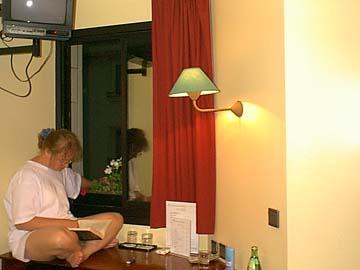
PARIS
Monday, June 5, 2000
Our hotel served our group a "bread" breakfast, stashing us in the farthest reaches so that we would not be seen, I suppose. Then we headed out with Suzy. But just as we reached the bottom of the hill where our tour bus waited, we realized that J.D., who was rooming alone in Paris, was not with us. Suzy effortlessly jogged back up the hill, yanked J.D. out of bed and jogged back with him in tow, delaying our trip by only a few minutes.
Our tour guide that morning was a wonderful little Oriental/French man who gave us a spectacular tour of Paris, undeterred by the rain. We stopped at Notre Dame and had a quick tour, but it was very dim inside and difficult to see.
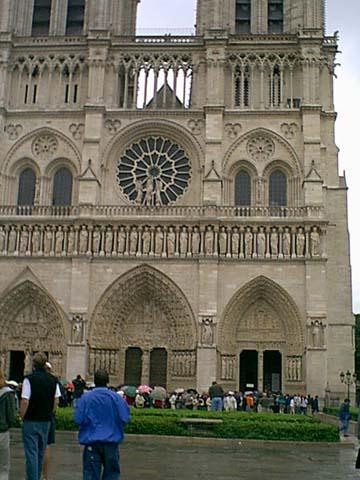
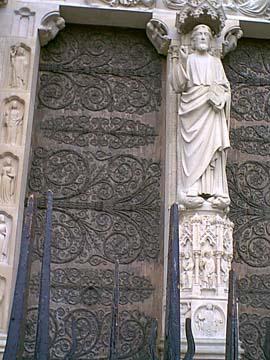
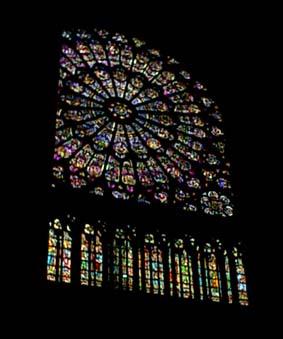
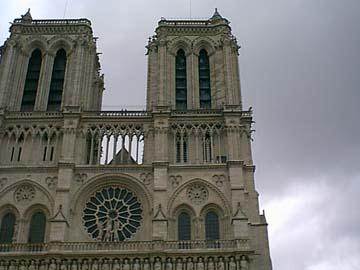
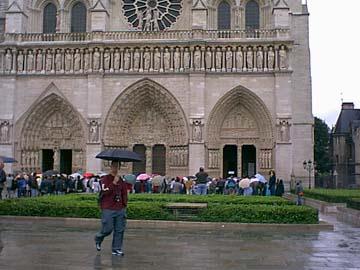
The bus stopped so that we could have our pictures made with the Eiffel Tower in the background. Tomorrow we would actually visit this magnificent structure.
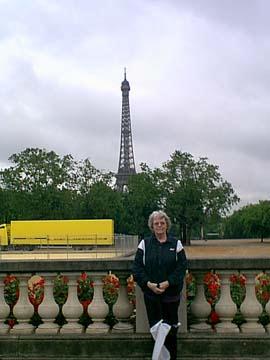
JUDY
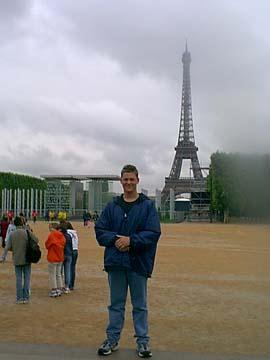
J.D.
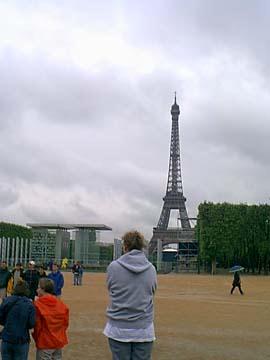
MELISSA

MELAINE AND MICHELLE
And we had a quick look at the Arc de Triomphe
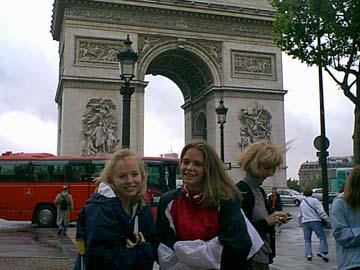
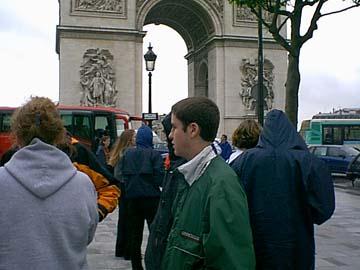
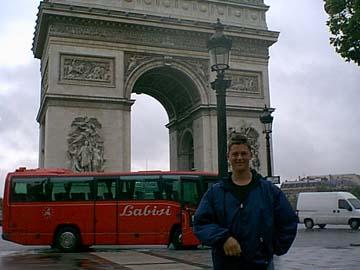
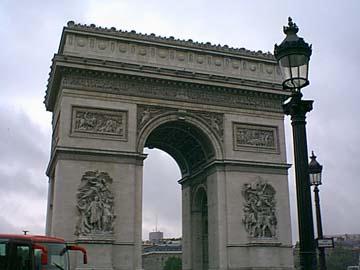
Our bus tour ended at the Paris Opera house, which was being renovated, but we could see its beauty beneath the scaffolding and paint-stained tarps. Our group quickly decided to visit the little perfume factory that was just a short distance away. The fragrances were wonderful, all made from distilled flower petals and no animal parts; and I think every one of us bought something there, even the guys.
Then we made a quick stop at the money changers. Here we changed dollars into Pisetas. We would be taking an overnight Talgo train to Madrid Tuesday evening, and we wanted to make certain we had at least a little money that would be spendable when we arrived Wednesday morning. Money changing was a big pain, and costly. It was also very unsettling to not have money that would spend so we tried to exchange close to the amount we thought we would need, which was a difficult thing to guesstimate.
Then up the street a bit further we went to visit the Lafayette Department Store, where we ate lunch in the cafeteria. This cafeteria had hundreds of choices and none of us chose chicken. I had dessert for lunch.
And only in Paris would a department store have such a magnificent dome in its center.

Melissa bought a wonderful yellow jacket here - but we'll save that sad tale until later. Melissa and I were supposed to meet the rest of the group outside the store, but our watches were not synchronized or our brains malfunctioned and we didn't make connections, but thankfully we all met up together in front of the Paris Opera, where Suzy prepared us for a "short fifteen minute walk" to the Louvre.

EN ROUTE TO THE LOUVRE
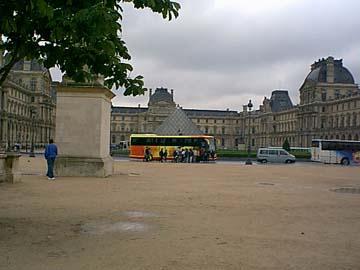
THE LOUVRE BACK ENTRANCE
Suzy took us the back way so that we could avoid the great crowds. One of the many benefits of having a tour guide is that you don't have to struggle to buy tickets - they do it for you, hand them to you, and lead you around the long lines. Our secret entrance is to the left of this picture near the boy in the blue jacket. If you want to visit the Louvre on-line, there are many wonderful sites, but here is one that is fairly complete - The Louvre

THE LOUVRE
Everything I saw was incredible - I was experiencing sensory overload (not to mention - lost), before I ever found my way back to the meeting place in the Lobby of the Louvre at the end of our two hours of free time.
The Mona Lisa was especially striking. All the photos I've seen of this painting do not do it justice. The in-person Mona Lisa has a glow coming from inside. An incredible work of art.
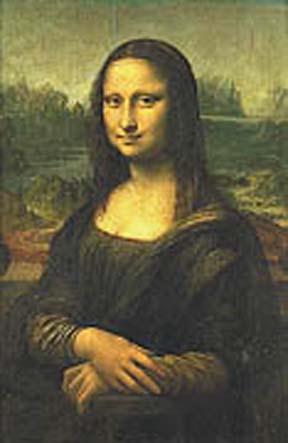
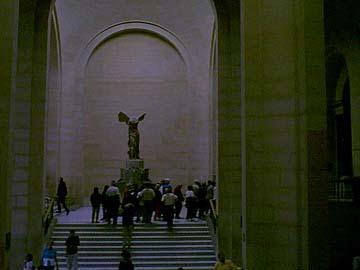
WINGED VICTORY

VENUS
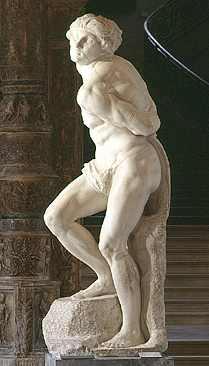
MICHELANGIOLO'S SLAVE
The Metro (underground to you Brits and Subway to Americans), came right inside the Louvre and we took it, after making several bewildering changes, to the place where we would dine that evening.
At this point, I have to tell you what a wonderful story teller and historian Suzy was. She was fluent in five languages - English, of course as she was British, French, Spanish, German, and Italian. She was a brilliant young lady, probably younger than 30. Her knowledge and talents were put to good use as she wove the histories of England, France, and Spain together, leaving us with a majestic tapestry to bring home with us.
She apologized for "rattling on," as she said her job was actually just to keep us safe - but because she loved to talk, she would continue to tell us useful and interesting bits of information as we progressed to the end of our tour. Of course, we all were eager to hear everything she had to say and considered her "rattling on" to be a great bonus for our trip.
At dinner this evening, she told of the German officer who was ordered by Hitler to blow all the lovely buildings of France to smithereens when Hitler withdrew from France. Because he did not follow this order, he was shot. I will someday discover his name and more about him, as I think he needs a poem written in his honor. Actually, he should have a great stone monument. It's chilling to think that all the magnificent buildings of France could have been lost, and if the story is actually true, this man's courage deserves to be memorialized.

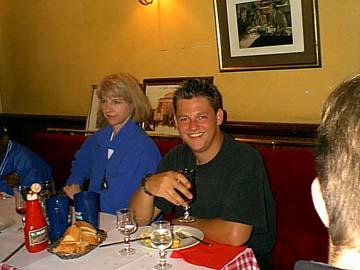
EVENING IN PARIS
Two very interesting web sites on Paris are this one and this one
AN UPDATE
I was able to discover the name of the German General who refused to follow Hitler's orders to destroy the lovely City of Paris. He was not shot for this, which was fortunate for him, but it will make it much harder to write a dramatic poem. What follows is a bit of information about him. This information was taken from this web site:
Dietrich von Choltitz
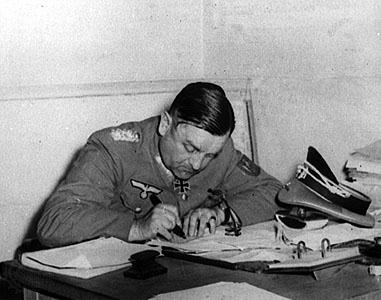
Dietrich von Choltitz signs the terms of surrender of the German garrison in Paris, Aug. 25, 1944
AP/Wide World Photos
(b. Nov. 9, 1894, Neustadt, Ger. [now Prudnik, Pol.]--d. Nov. 4, 1966, Baden-Baden, W.Ger.), army officer who was the last German commander of Nazi-occupied Paris in World War II.
Choltitz was a professional officer in the German army from 1914. He served in the invasion of Poland in 1939, the invasion of France in 1940, and the siege of Sevastopol in 1941-42. After serving in 1943-44 as commander of a panzer (armoured) corps on the Russian front, he was transferred in June 1944 to France, where his corps was ordered to hold the Cotentin Peninsula after the Normandy Invasion.
On August 7 Choltitz, having failed to stop the breakout of U.S. forces into Britanny, was appointed military commander of the French capital city of Paris, German control of which was being threatened by the approaching Allied armies. Choltitz's orders, originating with Adolf Hitler himself, were to destroy bridges, major buildings, and other key facilities in the city rather than let it fall into Allied hands undamaged. Recognizing the military futility of these orders, and repelled by their barbarity, Choltitz instead agreed to a truce with French Resistance forces in the city and handed over Paris unscathed to General on August 25, 1944.
Choltitz was held in a prisoner-of-war camp in the United States until 1947, whereupon he returned to Germany. Snubbed by fellow former officers, he wrote a book, Brennt Paris? (1951), in which he defended his disobedience of a leader whom he felt had gone mad. His book was the principal source for a best-selling popularization, Is Paris Burning? (1965), by Larry Collins and Dominique Lapierre.
PREVIOUS
PAGE NEXT
PAGE
NEXT
PAGE
The Contents of these Pages are owned soley by Judy sadler

Email: iron_side45@yahoo.com



























 NEXT
PAGE
NEXT
PAGE